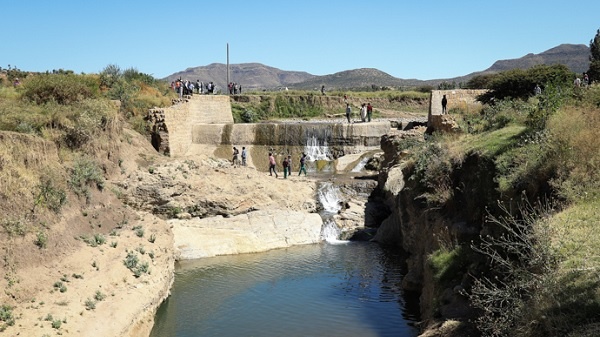
On World Day to Combat Desertification and Drought, Trócaire’s Seán Farrell reports about his visit to a life-changing water project in Ethiopia, and the need for Climate Justice.
By Seán Farrell (Trócaire)
Where there is water there is life is an ancient saying. In fact, historically many of the world’s earliest settlements were based alongside water sources and rivers. Some of the earliest evidence of human settlement was in Ethiopia, the country known as the ‘cradle of civilization’.
Ethiopia today however is facing many challenges. Climate Change is challenging the very fabric of many societies and clean water is becoming increasingly absent for so many people around the world. According to the WHO, three in ten people in the world lack access to safe water at home. Six in ten lack safely managed sanitation.
People in developing countries suffer the most. Inadequate water supply leads to food shortage, potentially famine, ecological decline and conflict over resources.
Water is life
I traveled to Northern Ethiopia to visit a community in Adigrat. Here I saw a small reservoir, which had pipes running for 5km bringing water and life to green crops. It moved me to see this simple reservoir providing support to hundreds of families.
Trócaire, with the support of DFID UKAID Match funding, is working with poor communities like Adigrat across Northern Ethiopia. In places where harvests are regularly destroyed by increasing droughts and lack of rainfall, this DFID program is helping communities to respond.
Communities are now conserving soil, harvesting animal fodder and finding new ways to farm. They are becoming more resilient to the droughts that are increasing in intensity and frequency.
I walked to a river dam where water is trapped and then used to grow a vast array of crops. I saw the work that rural communities had done in building terraces on the sides of mountains that trap water and assist food to grow even in times of drought. This work is overwhelming and is making a real difference to so many lives.
‘One of the great moral questions of our time’
But we must also reflect on our own lifestyles. The families I met in Northern Ethiopia have contributed almost nothing to the footprint of climate change. But they are paying the highest price. This is one of the great moral questions of our time. We must act now in our own lives, and we must demand political action to halt climate change.
Each Irish person is responsible for as much carbon emissions as 88 Ethiopians, meaning that it would take 404 million Ethiopians – over four times the population of that country – to match Ireland’s carbon footprint.
We know this is not sustainable. We in Ireland are the 8th highest carbon emitter per capita in Europe, and the 35th highest globally. We are significantly off-track for meeting our 2020 emission reduction targets.
We cannot sit on the fence and ignore this reality. In places such as Adigrat over 80% of the population depend on the rains to survive, and climate change has had devastating effects on the lives and livelihoods of poor people.
We must continue to work with these communities to help them to adapt and cope with this reality. Yet we must also call on our own leaders to deliver national policies and action in Ireland so that we too can play our part in tackling this global challenge.
Source: Trócaire

Thanks